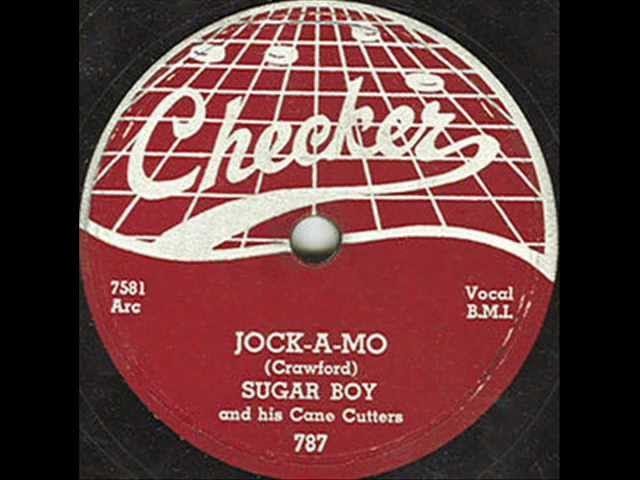Jock-A-Mo
Sugar Boy Crawford and his Cane Cutters (1953). Excerpt from "The 50 Songs that Gave Birth to Rock and Roll"
We’ve popped into New Orleans on multiple occasions throughout this historical trek, as must any accurate journey through the roots of American music. Naturally, most of the songs we’ve included capture that distinctively festive, boozy, and horn-heavy sound we’ve come to associate with the Crescent City.
But there is a separate and equally consequential strand of music that comes from the city’s tradition of revelry. While the music of Fats Domino and Lloyd Price put a Big Easy spin on R&B and jump blues, “Jock-A-Mo” renders hit material out of a chant descended from Mardi Gras Indians.
The song tells the story of two clashing Mardi Gras clans. As tempers flare, one of the tribe’s “spy boys” threatens to set the other tribe’s flag on fire. The history of the so-called Mardi Gras Indians—members of the city’s population who dress in colorful Native American regalia to celebrate the annual festival—is its own story and one I urge you to research when you have some time.
But for our purposes, Sugar Boy Crawford and His Cane Cutters offer the landmark artifact of the genre. “Jock-A-Mo” captures all the bounce and sway of Mardi Gras in a single recording. Sugar Boy’s version was released for Chess Records and was not a national hit. It would, however, become a standard in New Orleans—among a handful of songs that remain, to this day, emblematic of Mardi Gras and the city as a whole.
When it was re-recorded by the Dixie Cups in 1965 as “Iko, Iko,” it would become a hit and the subject of a dispute over authorship.
Sadly, the Dixie Cups would eventually be awarded sole status as writers of the song, in spite of the indisputable evidence of Crawford’s groundbreaking contributions.
Thereafter, Crawford would earn only a small cut from live performances.
Crawford would largely disappear from public view, particularly after a 1963 beating by police officers that left him physically hobbled for years. Crawford did live to the age of 77, dying in 2012.
In one form or another, “Jock-A-Mo” would never leave the public eye. The song would not only become a staple of Grateful Dead setlists and a constant presence on the charts via hit versions by the Belle Stars (1982) and Cyndi Lauper (1986), but it remains even to this day as omnipresent in New Orleans as booze and beignets.
See the full list of 50 Songs that Gave Birth to Rock and Roll





Crawford's backup band was originally called "The Chepaka Shaweez" (a bit of local 1950s New Orleans slang that only people from that time and place would probably get). Obviously, Chess felt people outside of Nola would not get that, whereas cutting sugar cane was something they would understand...